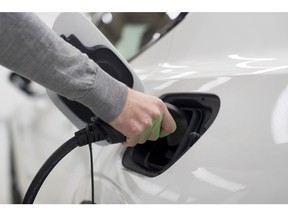
Article content
(Bloomberg) — The US Commerce Department set the stage for anti-subsidy duties on imports of key battery components from China, after concluding materials had been unfairly subsidized.
THIS CONTENT IS RESERVED FOR SUBSCRIBERS ONLY
Subscribe now to read the latest news in your city and across Canada.
- Exclusive articles from Barbara Shecter, Joe O'Connor, Gabriel Friedman, and others.
- Daily content from Financial Times, the world's leading global business publication.
- Unlimited online access to read articles from Financial Post, National Post and 15 news sites across Canada with one account.
- National Post ePaper, an electronic replica of the print edition to view on any device, share and comment on.
- Daily puzzles, including the New York Times Crossword.
SUBSCRIBE TO UNLOCK MORE ARTICLES
Subscribe now to read the latest news in your city and across Canada.
- Exclusive articles from Barbara Shecter, Joe O'Connor, Gabriel Friedman and others.
- Daily content from Financial Times, the world's leading global business publication.
- Unlimited online access to read articles from Financial Post, National Post and 15 news sites across Canada with one account.
- National Post ePaper, an electronic replica of the print edition to view on any device, share and comment on.
- Daily puzzles, including the New York Times Crossword.
REGISTER / SIGN IN TO UNLOCK MORE ARTICLES
Create an account or sign in to continue with your reading experience.
- Access articles from across Canada with one account.
- Share your thoughts and join the conversation in the comments.
- Enjoy additional articles per month.
- Get email updates from your favourite authors.
THIS ARTICLE IS FREE TO READ REGISTER TO UNLOCK.
Create an account or sign in to continue with your reading experience.
- Access articles from across Canada with one account
- Share your thoughts and join the conversation in the comments
- Enjoy additional articles per month
- Get email updates from your favourite authors
Sign In or Create an Account
or
Article content
Article content
The agency’s preliminary determination is an early milestone in a trade case looking at supplies of active anode material, which is vital for electric vehicle batteries, and includes materials such as graphite and silicon.
Article content
Article content
US graphite producers were among the petitioners that asked for investigations into whether China’s massive state subsidies are artificially lowering prices and making it harder for them to compete. A sharp tariff increase would raise the cost of US-made EVs at a time when a Republican tax plan would eliminate consumer credits on the vehicles.
Article content
By signing up you consent to receive the above newsletter from Postmedia Network Inc.
Article content
The preliminary duties announced Tuesday by the Commerce Department are meant to counter subsidization of the material, though a separate probe of alleged unfair pricing is also underway. Final decisions are expected later this year in the trade cases, which are separate from President Donald Trump’s widespread tariffs on all trading partners as well as planned levies on semiconductors, pharmaceuticals and other goods.
Article content
The Commerce Department found that Chinese producers and exporters are benefiting from subsidies worth as much as 721%. Those companies include Huzhou Kaijin New Energy Technology Corp. and Panasonic Global Procurement China Co. Both firms didn’t immediately respond to requests for comment.
Article content
China produces most of the world’s graphite, and US battery makers rely on the country for the material. Around 56% of the US’s energy transition-related graphite demand was met by Chinese imports in 2024, according to analysis by BloombergNEF.
Article content
—With assistance from Jennifer A. Dlouhy and Ocean Hou.
Article content
(updated with more details in the final two paragraphs)
Article content

.jpg) 5 hours ago
1
5 hours ago
1
 English (US)
English (US)